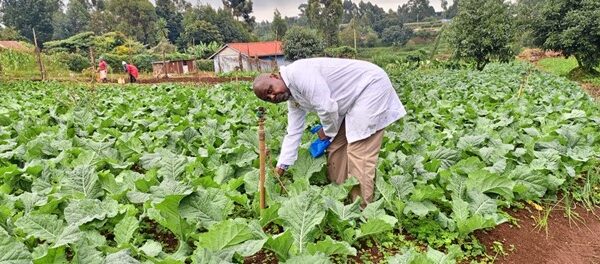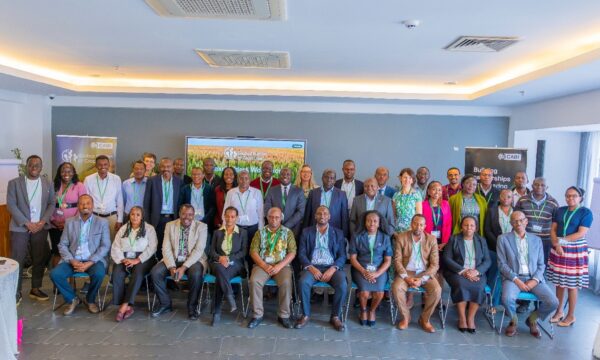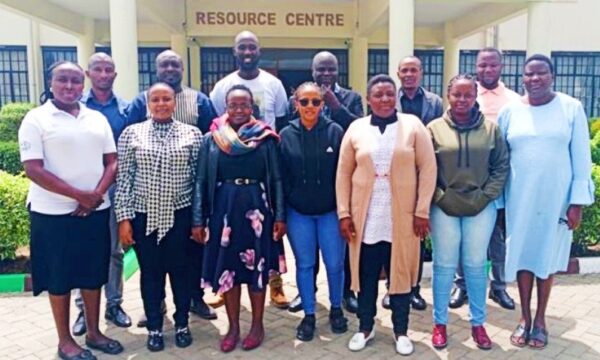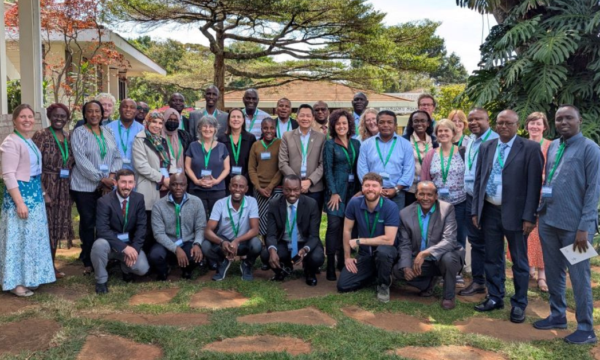
“We are not just growing crops. We are growing trust, dignity, and resilience. And that starts with being seen, heard, and involved from the beginning.”
Phyllis Nduva, Farmer and Cooperative Leader
“Research must always be discussed before it starts. People need to know what’s coming, and how it affects them.”
Joseph Kahunga Mwangi, Retired Teacher and Community Leader
These are the voices helping to shape the future of agricultural research in Africa. The CABI in Africa Regional Centre in Nairobi, Kenya recently launched the CABI Institutional Scientific and Ethics Review Committee (CABI ISERC), following its accreditation by Kenya’s National Commission for Science, Technology and Innovation (NACOSTI).
What really makes this committee stand out is the inclusion of voices like Ms Nduva and Mr Mwangi, who bring real-life experience and community insight to the table. As respected farmers and community leaders, they will represent the realities on the ground and play a vital role in co-designing solutions that are practical and impactful, writes Eunice Murathe, Corporate Communications Officer at CABI.
Advocating for farmer voices and food safety
Ms Nduva is not new to agriculture. She grew up working the land with her parents and recalls being recognized from a young age for her precision in planting. Today, she leads Makueni Fruit Cooperative with over 5,000 farmers. Her passion goes beyond yields and she trains others in good agricultural practices, advocates for safer food, and believes that true food security starts when farmers’ voices are heard and scientists work hand-in-hand with them.

She also advocates for continuous follow-up in agricultural research. “We can’t stop at the trials or pilot projects. We must follow through, implement findings and share them widely, so all farmers, working or not, benefit.”
She notes farmers often struggle to scientifically quantify their experiences with pests, diseases, and shifting climate patterns. While traditional methods exist and are widely practiced, they are not always scientifically proven.
She emphasizes that researchers play a crucial role in validating these farmer observations and translating them into evidence-based solutions, such as Integrated Pest Management (IPM) supported by proper chemical usage guidelines.
“Farmers carry a world of lived experience, season after season, we discover what works through practice and observation. Scientists bring deep knowledge from research,” she says. “When we walk together, we can create solutions that work not just in labs, but on actual farms and lead to better yields.”
A voice for ethical, community-centered research
Joining her on the committee is Joseph Kahunga Mwangi, a retired secondary school teacher and former principal who turned to full-time farming after nearly 40 years in education. Joseph grows cabbages, sukumawiki, maize, and bananas for his household and raises pigs and chickens commercially, supplying mature pigs to processors. But beyond the farm, he is deeply involved in his community, as a church leader and coordinator of local welfare initiatives.
Joseph brings not only agricultural experience but also moral and social leadership to the table.“ Research should never begin without proper community engagement,” he says. “We need to understand what’s being done and why so people aren’t caught off guard or misled.”

What Is CABI ISERC?
CABI’s Research Officer Idah Mugambi, explains that as part of its mandate to ensure research quality, NACOSTI has delegated the responsibility of ethical review of research proposals to Institutional Scientific and Ethics Review Committees (ISERCs) accredited in Kenya.
ISERCs, accredited through NACOSTI’s Scientific and Ethics Committee, follow strict national guidelines and are typically based in research institutions, universities, and hospitals.
“They review research proposals for ethical compliance before NACOSTI can issue a licence,” said Ms Mugambi.
The newly accredited CABI ISERC will oversee ethics for CABI’s internal research and projects at national, regional, and international levels across biological, environmental, and social sciences.
The committee is chaired by Dr Daniel Karanja, with Dr Joseph Mulema serving as vice-chairperson and contact person. Ms Idah Mugambi holds the role of secretary. The team brings together a diverse mix of expertise and perspectives, including Ms Phyllis Nduva and Mr Joseph Kahunga as laypersons representing community interests; Dr Benson Mutuku, Dr Chapwa Kasoma, Dr Ivan Rwomushana, Ms Mary Bundi, Dr Monica Kansiime, Mr Walter Hevi, and Ms Wanjiku Kiarie as committee members from various scientific and development backgrounds; and Mr George Ogembo, who serves as the legal expert.
Diverse and inclusive committee composition
“Ethics in research is not just about compliance,” says Dr Joseph Mulema, Senior Scientist, Research at CABI. “It’s about ensuring that our work truly benefits the people and ecosystems we aim to support.”
He emphasizes that the formation of the CABI ISERC marks a meaningful shift in research culture, one that places community voices, scientific expertise, and legal insight at the heart of research governance.
He adds that the diverse composition of the committee is designed to ensure that research is not only scientifically sound and ethically robust, but also socially responsive.
“We want research to reflect real needs and deliver real change,” said Dr Mulema,“By involving a wide spectrum of stakeholders from field practitioners to policy influencers, the committee reflects CABI’s commitment to making research more accountable, inclusive, and impactful.”
Dr Morris Akiri, Senior Regional Director, Africa at CABI, notes the establishment of the ISERC demonstrates the CABI’s strong commitment to conducting research that upholds the highest scientific standards while ensuring the protection and inclusion of the communities it serves.
Joining a select group of research institutions
With its recent accreditation by the National Commission for Science, Technology and Innovation (NACOSTI), CABI ISERC becomes the 35th accredited ISERC in the country. These include 22 universities, six hospitals, four research institutions, two joint ISERCs (university and hospital), and one non-governmental organization.
CABI also joins the International Livestock Research Institute (ILRI) as one of only four research institutions in Kenya with an accredited ethics committee.
This milestone affirms CABI’s consistent adherence to the Science, Technology and Innovation (ST&I) Act. The organization is fully registered as a research institution in Kenya (NACOSTI/2019/12/19, Legal Notice 106), and all research it conducts in Kenya undergoes mandatory ethical clearance (Legal Notice 107) before receiving a research licence (Legal Notice 108).
Additional information
Main image: A youth service provider from Makueni in Kenya, where Phyllis Nduva serves as a cooperative leader, inspects a mango tree. Through its training and linkage programme, CABI equips young people to deliver agricultural services to cooperative members and affiliated businesses (Credit: CABI).
Related News & Blogs
CABI workshop explores gendered impact of maize crop loss in Kenya
A stakeholder inception workshop recently hosted by CABI in Nairobi, Kenya, has explored how men, women, and youth are differently affected by maize crop loss, one of the most persistent challenges facing smallholder farmers across the country and beyo…
21 October 2025





